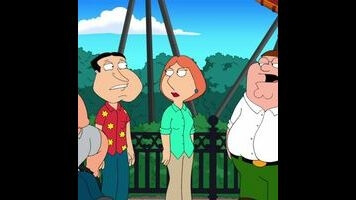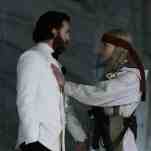(For the next several days, some of our writers will be swapping duties on some of our most popular shows. Some of them will like what they see, but for different reasons. Some of them will have vastly different opinions from the regular reviewers. And some of them won’t be all that different. It’s Second Opinions Week at TV Club.)
Family Guy has never really been renowned for its tight plot structure, but tonight’s episode feels like a particularly shaggy entry. While the tale of Stewie and Brian’s burgeoning love affair with the ballads of Canadian songstress Anne Murray has a discernible beginning, middle, and end, the main Chris-centric plot is less a story than it is a trio of loosely connected set-pieces. The first set of gags revolves around Chris’ unpopularity at high school because he doesn’t have the right shoes. Once he steals money from his mother’s purse to get new shoes, the high school story is dropped entirely to make way for Meg blackmailing him and forcing him to do her bidding. And once Chris can no longer endure his sister’s increasingly disturbing demands, he runs away to live with the elderly predator Herbert, who soon finds Chris a less-than-ideal houseguest (and, yes, illicit lover, but I’d prefer not to think too much about that). There’s a vague attempt at the end to spin a sentimental moment out of Chris and Meg’s sibling reunion, but other than that, the Herbert subplot doesn’t really have anything to do with what comes before it, and there’s no payoff for Chris’ earlier theft.
Part of the problem is that Chris really doesn’t have a personality, at least not as depicted in “Chris Cross.” Admittedly, outside of Stewie and Brian, most of the show’s characters tend to be one-note, but at least they have that one note. Chris’ defining trait is usually his stupidity, and of course, Chris has to be pretty damn idiotic to think going to live with Herbert is a good idea. But whereas the episode plays up his obliviousness while living with Herbert, Chris is relatively sharp when dealing with Meg’s particular brand of crazy, so there’s little sense of Chris as a consistent character with coherent motivations, even purely in the context of the episode. When the episode needs Chris and Herbert to act like a squabbling couple, Chris gets a joke-mandated jolt of personality, but before that, he’s often a blank slate, barely reacting to the things his schoolmates, Meg, and Herbert say and do. Chris closes on the moment of wisdom about how he and Meg need to look out for each other when living in a family as crappy as theirs, but there’s no real sense of why that particular lesson should be gleaned from this particular set of events we’ve just witnessed, or why Chris should be the one to have that insight.
Now, it’s not that the episode needs Chris to have a big dramatic arc for the story to be worthwhile, especially when that isn’t what Family Guy does. But even a simple, semi-serious theme about how, say, Chris is desperate for acceptance—something that could theoretically be inferred from how he deals with people throughout this episode but isn’t really even hinted at in the story itself—would give the episode some narrative energy. Indeed, whereas Chris is largely a cipher, we do get a bit of interesting character work when Meg enters the story, as the tasks she assigns Chris reveal a desperately lonely, hatefully vindictive young sociopath. Admittedly, the character-based jokes only occasionally work any better than the usual barrage of one-liners: I quite liked the Officer And A Gentleman bit, and, against my better judgment, I appreciated the shock value of the Planned Parenthood gag, if only for the terrifying glimpse into Meg’s psyche that it provided, but I really, really could have done without that Anne Frank gag. The Meg section isn’t necessarily funnier, but there’s occasionally sense that we’re observing an actual character, as opposed to couple of blank slates trading a bunch of lazily “shocking” gags and warmed-over one-liners.
Indeed, the entire Chris story lives and dies on its jokes, and as such, it mostly dies. There are a couple half-decent gags here and there, particularly the absurdity of the flashback to Chris’ thin, well-hatted days. And honestly, I appreciated the fact that the episode didn’t always go for the absolute most appalling, offensive pedophilia jokes when it came time for Chris to shack up with Herbert. (Yes, that sentence is pretty much the apotheosis of damning with faint praise.) I can’t say I found the eventual reveal that Herbert is repulsed by Chris’ slovenly ways to be especially funny, but that was purely down to it not being a sharply written gag rather than me having any moral objection to the concept. When so much of the episode feels so slack and lifeless, there’s really little chance of salvaging the thing.
That said, the Brian and Stewie story is considerably better, with a terrific punchline that is hugely reliant on—and here’s something I never thought I would write—the comedic performance of Anne Murray. The central gag isn’t really at her expense, but rather at the general idea that anyone could be that into her music, particularly a pair of weathered cynics like Brian and Stewie. Really, the multiple cutaways scored to her music are played bizarrely straight, and this ginger handling probably has something to do with the fact that she actually appears in the episode (although since I don’t have any particular beef with Anne Murray, I’m not all that bothered about this). Maybe it’s just because puppy Brian is so damn cute, but the flashback to his early days playing with his family actually works as a genuinely touching moment, and it actually seems reasonable enough that Brian would instantly become an Anne Murray super-fan.
Without a clear comedic target, this storyline mostly gets by on more observational, low-key humor, like Stewie and Brian debating whether a letter from a friend has edge: Brian points out envelopes have edges, and Stewie pointedly retorts that he’s a dick. That scene actually hints at a topic ripe for satirical examination—whether art needs to be “edgy” to be worthwhile—but it’s probably for the best that the episode sticks with more character-based gags. Some of the best jokes in “Chris Cross” revolve around Brian and Stewie displaying their over-the-top devotion to Anne Murray, like Stewie’s sardonic rejoinder “Yeah, I’ve heard the song” when Brian quotes lyrics to him or Stewie randomly declaring it awesome that Brian is whistling “Snowbird.”
Anne Murray herself proves to be a surprisingly good sport, setting up the episode’s best gag. At first, her appearance seems to be the bog-standard celebrity cameo, in which the regular characters act awestruck while she delivers some joke-free lines about the meaning of her song. But Family Guy manages an actual subversive turn when Stewie breathlessly describes a time he misheard his friends suggest a trip to a tapas bar, to which Anne Murray vapidly responds, “That’s a great story.” It’s the first indication that Murray won’t be treated completely respectfully, which of course is soon emphatically proven when Stewie learns she didn’t write “Snowbird.” The final image from this storyline, in which a bound and gagged Anne Murray is forced to perform a duet of “Snowbird” with a gun-wielding Stewie is unexpected and amusing enough—if only for the admittedly somewhat cheap gag of hearing Murray herself sing a muffled version of the song—but the pullout to a moose bopping its head in time with the melody is a legitimately funny, inspired capper. It’s a lone moment of originality in what is too often a rote, lackluster episode, but then I suppose there’s only so much Anne Murray to go around.
Stray observations
- I’m not particularly proud of this, but I’m honest enough to admit that I laughed at the Georgia O’Keeffe cutaway. I guess I have a soft spot for the occasional bit of high-brow (or pseudo-high-brow, at any rate) crassness.
- Speaking of crass, I don’t generally care for Peter, but this episode found some good uses for him. I laughed at his aside to Lois that their son is a big dumb loser—after all, just look at his shoes!—and the cards Chris discovered that revealed his father’s ready-made apologies for farting on other people’s cars.








































